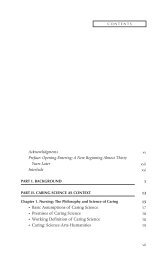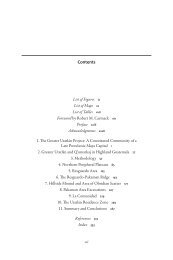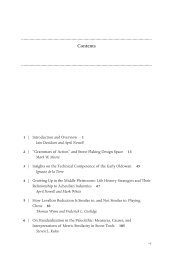free download - University Press of Colorado
free download - University Press of Colorado
free download - University Press of Colorado
You also want an ePaper? Increase the reach of your titles
YUMPU automatically turns print PDFs into web optimized ePapers that Google loves.
Ben Fitzhugh<br />
Large storms pass through the Kurils year-round but with particular intensity<br />
between September and May. Winter storms are more violent and bring<br />
hazardous sea ice and other debris into the Sea <strong>of</strong> Okhotsk and the southern<br />
(and sometimes northern) Kurils. Boat landings in storms are particularly<br />
perilous and would have been exceedingly challenging on many <strong>of</strong> the smaller<br />
islands, with little or no protection from wind and swells. Storm waves and wind<br />
can push large logs and ice high up the beach and onto low coastal benches or<br />
terraces, creating hazards for beached boats and any residences placed too close<br />
to sea level. Understanding how weather and currents interact to create dangerous<br />
conditions would have been a prerequisite to settling the central Kurils for<br />
any past colonists.<br />
Changes in the patterns, frequency, and intensity <strong>of</strong> weather over periods<br />
ranging from decades to millennia constitute climate change. Changes at these<br />
scales altered the dynamics <strong>of</strong> storminess, the hazardousness <strong>of</strong> travel, and productivity<br />
<strong>of</strong> the marine ecosystem in ways that should be reflected in human<br />
adaptations and possibly in changes in the nature <strong>of</strong> settlement, as they affect<br />
the sustainability <strong>of</strong> the food supply and the maintenance <strong>of</strong> social networks<br />
through the islands (discussed later). In cold climates, the North Pacific lowpressure<br />
system tends to intensify, causing strong northerly winds to accelerate<br />
the Oyashio Current that brings nutrient-enriched cold Arctic waters south<br />
from the Bering Sea to the Kurils (Qiu 2001).<br />
This same mechanism intensifies the counterclockwise circulation <strong>of</strong> the<br />
Sea <strong>of</strong> Okhotsk, bringing iron-enriched waters from the mouth <strong>of</strong> the Amur<br />
River to eastern Hokkaido and the southern Kurils. In warmer climate periods<br />
the Oyashio Current, including the Okhotsk gyre, weakens, and a more stratified<br />
surface layer limits the degree <strong>of</strong> nutrient enrichment available for photosynthesis<br />
and primary production (ibid.). The North Pacific low-pressure system<br />
is strongest in winter months when light is least available in the subarctic<br />
waters <strong>of</strong> the Kurils and the Sea <strong>of</strong> Okhotsk. As a result, increased winter mixing<br />
actually tends to reduce primary productivity by limiting the penetration<br />
<strong>of</strong> available light into the water column, despite availability <strong>of</strong> nutrients. In<br />
the south, <strong>of</strong>f the east coast <strong>of</strong> Hokkaido and the southernmost Kurils, where<br />
winter light is stronger, primary productivity correlates with Oyashio Current<br />
strength (Chiba et al. 2008). While the mechanisms are still to be fully understood<br />
(e.g., Schneider and Miller 2001), primary productivity overall should<br />
be enhanced in the southernmost Kurils/Hokkaido in cold periods, while in<br />
the central and northern Kurils primarily, productivity is actually observed to<br />
increase somewhat in warmer periods when spring light returns to the region<br />
(Chiba et al. 2008; Heileman and Belkin 2008). Thus, in a general way we can<br />
expect that cold climates would have enhanced the biomass available for maritime<br />
hunter-gatherers in the southern Kurils, while warmer climates could have<br />
made these islands less attractive. On the other hand, warm climate declines in<br />
32





